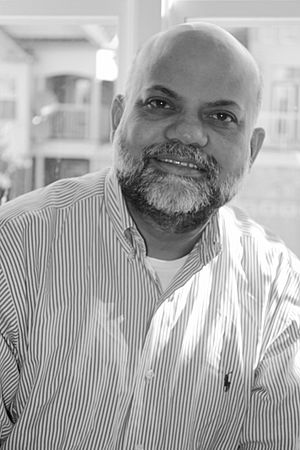Iqbal Quadir facts for kids
Quick facts for kids
Iqbal Quadir
|
|
|---|---|
 |
|
| Born | August 13, 1958 (age 67) Jessore, Bangladesh
|
| Education | Swarthmore College (BS) University of Pennsylvania (MA, MBA) |
| Known for | Founder of Grameenphone |
| Relatives | Kamal Quadir (Brother) |
Iqbal Quadir, born on August 13, 1958, is a Bangladeshi-American entrepreneur and teacher. He is known for starting companies that help people in developing countries.
One of his most famous projects was founding Grameenphone in Bangladesh. This company, started in 1993, aimed to bring phone access to people in villages. It also helped create new ways for people to earn money.
Quadir also worked at Harvard Kennedy School of Government. There, he studied how new technologies can change countries. In 2007, he helped create the Legatum Center for Development and Entrepreneurship at MIT. This center helps students learn about starting businesses in developing countries.
Contents
Iqbal Quadir's Early Life and Education
Iqbal Quadir was born in Jessore, Bangladesh. He moved to the United States in 1976 and later became a U.S. citizen. He finished his high school studies in Bangladesh.
He went to Swarthmore College and earned a Bachelor of Science degree in 1981. Later, he studied at the Wharton School of the University of Pennsylvania. There, he earned a Master of Arts degree in 1983 and a Master of Business Administration (MBA) in 1987.
Iqbal Quadir's brother, Kamal Quadir, is also an entrepreneur and artist.
How Iqbal Quadir Started His Career
Iqbal Quadir worked as a consultant for the World Bank from 1983 to 1985. He also worked for other companies, learning about business and finance.
Bringing Phones to Villages in Bangladesh
In 1993, Quadir had a big idea: to bring mobile phones to people in rural Bangladesh. He wanted to use technology to help people earn money. He started a company called Gonofone, which means "phones for the masses" in Bengali.
He brought together many different groups from around the world to help. These included Telenor from Norway, Grameen Bank from Bangladesh, and other organizations. Their plan was to let people in villages, often women, get small loans (called micro-loans). They would then use these loans to buy a phone and offer phone services to others in their village. This way, more people could connect, and the phone owners could earn money.
A famous economist, Jeffrey Sachs, praised this idea. He said it showed how much good phone access could do in poorer areas.
Teaching and New Ideas at MIT
From 2001 to 2005, Quadir was a Fellow at Harvard's Kennedy School. He taught classes about how technology helps developing countries.
In 2005, he moved to MIT. Two years later, in 2007, he helped start the Legatum Center for Development and Entrepreneurship. This center helps MIT students who want to start businesses in developing countries. It gives them resources and programs.
Quadir came up with the idea of the "invisible leg." This idea describes how new technologies can change how money and power are shared in an economy.
Helping with Electricity and Water
In 2006, Quadir started a company called Emergence BioEnergy, Inc. His goal was to help bring electricity to people in Bangladesh. At that time, many people there did not have access to the main electricity grid.
He also worked on a project to remove arsenic from water. These projects were even written about in The Economist magazine. In 2007, Emergence BioEnergy won an award for innovation. After working on these projects for about ten years, he decided to close them down.
Iqbal Quadir's Current Projects
Iqbal Quadir and his brother Kamal started bKash in Bangladesh in 2009. bKash is now the leading mobile financial service in the country. It lets over 70 million people use their phones for banking and payments.
In 2004, he and his siblings created the Anwarul Quadir Foundation. This foundation helps new ideas and inventions in Bangladesh. In 2006, the foundation started a global essay competition called the Quadir Prize. This prize gives $25,000 to people who come up with great ideas. In 2009, Stephen Honan won the prize for finding a way to remove arsenic from water and soil.
Awards and Recognition
Iqbal Quadir has received many awards for his work. In 1999, the World Economic Forum named him a Global Leader for Tomorrow. In 2006, he received the SEED Award for helping bring phone service to everyone in Bangladesh.
He has been featured on CNN and PBS. His work has also been written about in well-known magazines like the Harvard Business Review and The Economist. In 2007, The Wharton Alumni Magazine listed him as one of 125 influential people. He has also received honorary degrees from Swarthmore College and Case Western Reserve University.
Quadir is the head judge for the Legatum FORTUNE Technology Prize. This prize gives $1 million to people or groups who create new technologies that help low-income countries.
See also
- List of TED speakers
 | Shirley Ann Jackson |
 | Garett Morgan |
 | J. Ernest Wilkins Jr. |
 | Elijah McCoy |

